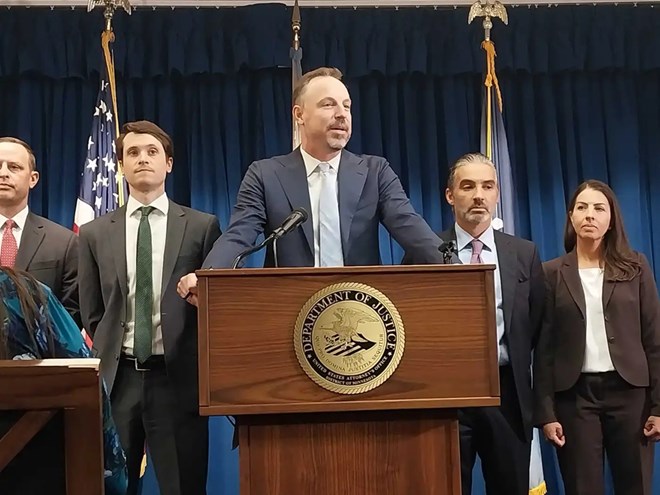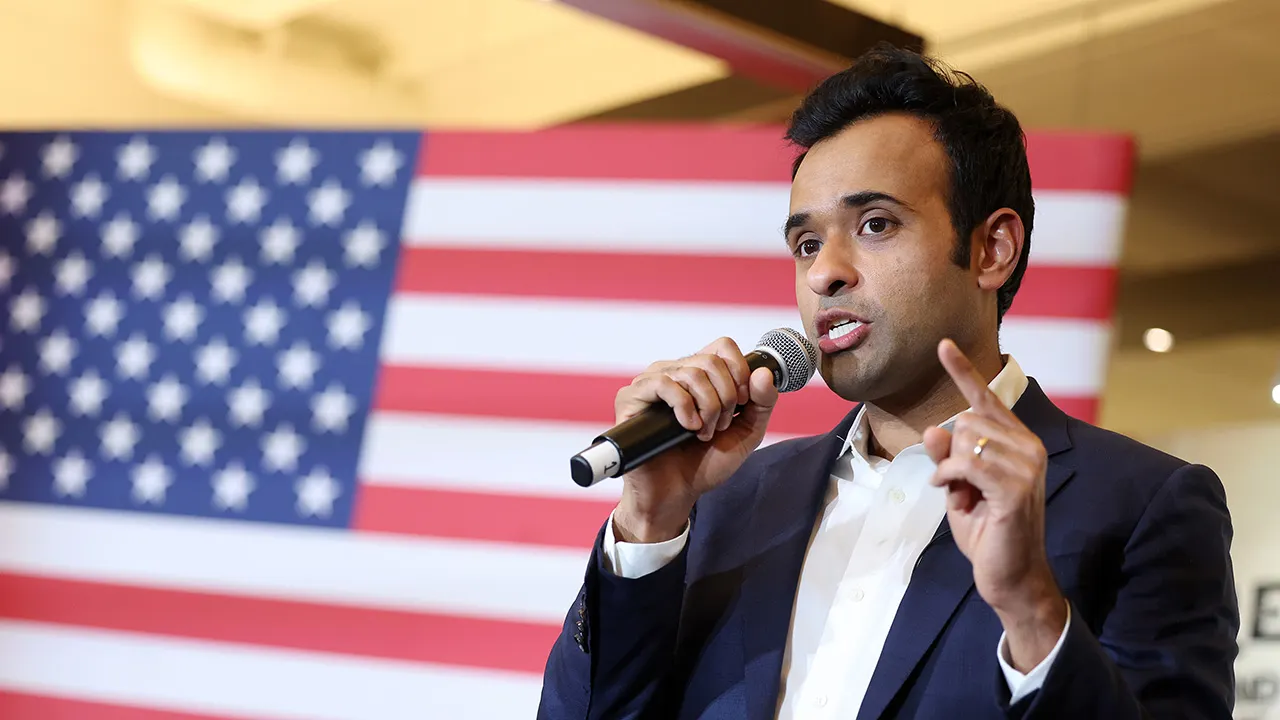
Hiiraan Online
Today from Hiiraan Online:
Somali Music
Google Plus
advertisements
Eight charged in $8.4M fraud tied to Minnesota housing program dismantled over $100M losses
FacebookFacebook messengerTwitterWhatsAppLinkedInTelegramEmail
Friday September 19, 2025
“Unfortunately, our system of trust-but-verify no longer works,” Acting U.S. Attorney Joseph H. Thompson said Thursday as he announced that eight people have been charged with fraud tied to Minnesota’s housing stabilization program.Estelle Timar-Wilcox | MPR News
MINNEAPOLIS, Minnesota (HOL) — Federal prosecutors have charged eight people in connection with more than $8 million in alleged wire fraud tied to Minnesota’s Housing Stabilization Services program, a Medicaid benefit created to help disabled and elderly residents secure housing but now being dismantled after officials uncovered what they called “large-scale fraud” that drained over $100 million in taxpayer funds.
Acting U.S. Attorney Joseph H. Thompson said Thursday the indictments mark the “first wave” of charges in a widening investigation into a program he called “riddled with fraud.”
“The level of fraud in these programs is staggering,” he told reporters. “These programs have been abused over and over to the point where the fraud has overtaken the legitimate services.”
Federal prosecutors allege that between 2021 and mid-2025, payouts exploded from an anticipated $2.6 million annually to more than $300 million total in less than five years, with much of that spending determined to be fraudulent.
The defendants are tied to four providers: Brilliant Minds Services LLC, Faladcare Inc., Leo Human Services LLC, and Liberty Plus LLC.
Brilliant Minds Services LLC
Four men, Moktar Hassan Aden, 30; Mustafa Dayib Ali, 29; Khalid Ahmed Dayib, 26; and Abdifitah Mohamud Mohamed, 27, allegedly operated a fraudulent provider called Brilliant Minds Services LLC.
Based out of the Griggs-Midway Building in St. Paul, Brilliant Minds submitted about $2.3 million in claims between September 2022 and April 2025, ranking among the state’s top ten billers in 2024. Prosecutors say they billed for consultations and transition services that were rarely delivered.
Investigators say Mohamed also ran another company in the same building, Foundation First Services LLC, which falsely claimed more than $222,000 in reimbursable consultations, often to other providers, including Brilliant Minds.
The indictment alleges the four defendants each pocketed $300,000 to $400,000 and shared a Platinum American Express card, racking up nearly $500,000 in personal charges paid from company accounts. They face six counts of wire fraud.
Faladcare Inc.
Prosecutors also charged Christopher Adesoji Falade, 62, and his son, Emmanuel Oluwademilade Falade, 32, who allegedly ran Faladcare Inc.
Operating from offices in Little Canada and Woodbury, the father-son duo claimed to serve about 100 beneficiaries but instead submitted more than $2.2 million in inflated and fraudulent claims. Court filings cite falsified day sheets and service verification forms transmitted by email as evidence of the fraud.
Leo Human Services LLC
In Brooklyn Park, Asad Ahmed Adow, 26, ran Leo Human Services.
According to court documents, he directed his employees to “bill as much as they could,” openly telling staff he would not scrutinize hours. Adow also instructed them to fabricate service notes solely to prepare for potential DHS audits, even though such notes were not required for reimbursement.
Leo Human Services billed $2.7 million for about 250 supposed clients, according to prosecutors. Adow allegedly diverted funds to invest in real estate in Kenya, lease a Roseville apartment, and purchase a 2024 BMW X4.
Liberty Plus LLC
Anwar Ahmed Adow, 25, the younger brother of Asad, operated Liberty Plus LLC out of Roseville.
Like his brother, Anwar directed employees to inflate hours without oversight. Liberty Plus received more than $1.2 million in Medicaid payments for roughly 200 clients, prosecutors say. He allegedly used the proceeds to lease a 2023 Mercedes-Benz CLA and make personal investments. The brothers are accused of pooling proceeds from their two companies.
FILE — The Diana E. Murphy United States Courthouse in Minneapolis, where federal prosecutors announced indictments against eight people accused of defrauding Minnesota’s Housing Stabilization Services program of more than $8 million.In total, the four companies are accused of stealing more than $8.4 million.
Federal indictments note that providers routinely acquired names of eligible clients from addiction treatment centers and other facilities, then used that information to generate inflated reimbursement claims.
Thompson said many defendants charged in the HSS fraud also operated other companies billing Medicaid under different programs, including autism therapy and personal care attendants. “The level of fraud is staggering,” he said. “We cannot prosecute our way out of this problem.”
Minnesota’s Housing Stabilization Services program launched in 2020 to help vulnerable adults find and maintain housing. Costs ballooned from $21 million in 2021 to $104 million in 2024, with $61 million paid in the first half of 2025, according to federal and state figures.
The Minnesota Department of Human Services (DHS) suspended payments to the charged companies in early August after “credible signs of fraud.” In total, DHS has halted payments to 115 providers suspected of fraudulent billing, collectively paid more than $100 million. Inspector General James Clark was more blunt, saying, “Too many fraudulent, unqualified bad actors have likely stolen money from our state’s taxpayers, and also cheated Minnesotans who need housing services.”
DHS has said it intends to redesign and relaunch the program in partnership with CMS, the Legislature, and community providers. Officials promised “robust program integrity and service quality requirements” to prevent bad actors from entering a new version of the benefit. In the interim, current beneficiaries are still allowed to apply and receive services from providers not under fraud suspension, but lawmakers warn that access will be disrupted.
The shut down ignited fierce criticism from state Republicans and renewed calls for a full federal audit of DHS.. House Speaker Lisa Demuth (R-Cold Spring) called it “too little, too late,” arguing that the Walz administration only acted after millions were already stolen. Senate Republican Leader Mark Johnson said the move was designed to “pull the plug before an audit can expose just how badly they mismanaged millions in taxpayer funds.”
Democrats, meanwhile, defended the shutdown as a necessary measure to prevent further theft. Gov. Tim Walz endorsed the decision, saying, “fraudulent actors will not receive another penny.”
The investigation involves the FBI, the Department of Health and Human Services-OIG, and IRS-Criminal Investigation, with assistance from Minnesota’s Bureau of Criminal Apprehension and the Attorney General’s Medicaid Fraud Control Unit. Minnesota Attorney General Keith Ellison said his office partnered with federal authorities and called for more resources to pursue Medicaid fraud.
Thompson, who has repeatedly warned about large-scale fraud in pandemic-era and Medicaid-linked programs, said enforcement alone is not enough. “We cannot prosecute our way out of this problem,” he said, urging stronger controls at the front end.
Defense attorneys for at least one defendant say their client denies the allegations and will contest the case in court.
Minnesota is home to one of the largest Somali communities in the United States. Several defendants are Somali, but prosecutors have not alleged ethnic or community-based targeting. Community advocates in Minnesota have long pushed for stronger oversight so that legitimate services, especially for disabled and unhoused residents, are not disrupted when bad actors are removed. DHS leaders have also acknowledged that the program’s deliberately low barriers were part of the problem. Temporary Commissioner Shireen Gandhi told lawmakers the model was designed to quickly expand access for vulnerable populations but left it “uniquely susceptible” to abuse.
The program’s vulnerabilities were built into its design. Providers needed only to be 18 years old, pass a background check, and complete five hours of online training videos . No professional licenses or experience were required. Beneficiaries qualified if they had Medicaid, a disability or “disabling condition,” and signs of housing instability. Billing requirements were minimal: names, service type, and hours, with no detailed notes necessary.
Fraud in state-administered programs has been a political flashpoint since the Feeding Our Future scandal, which exposed more than $250 million in stolen pandemic aid. Critics accuse Gov. Tim Walz’s administration of failing to act quickly enough to prevent fraud.
Walz has responded with an executive order creating a statewide Inspector General Coordinating Council and authorizing faster suspension of payments when fraud is suspected.
Opinion| Privacy Policy|Sports|Somali Music|Somali Map
All Rights Reserved Copyright. © 1999-2025, www.hiiraan.com



